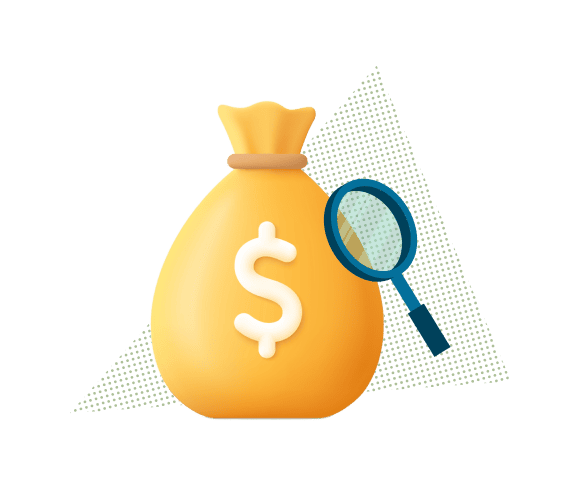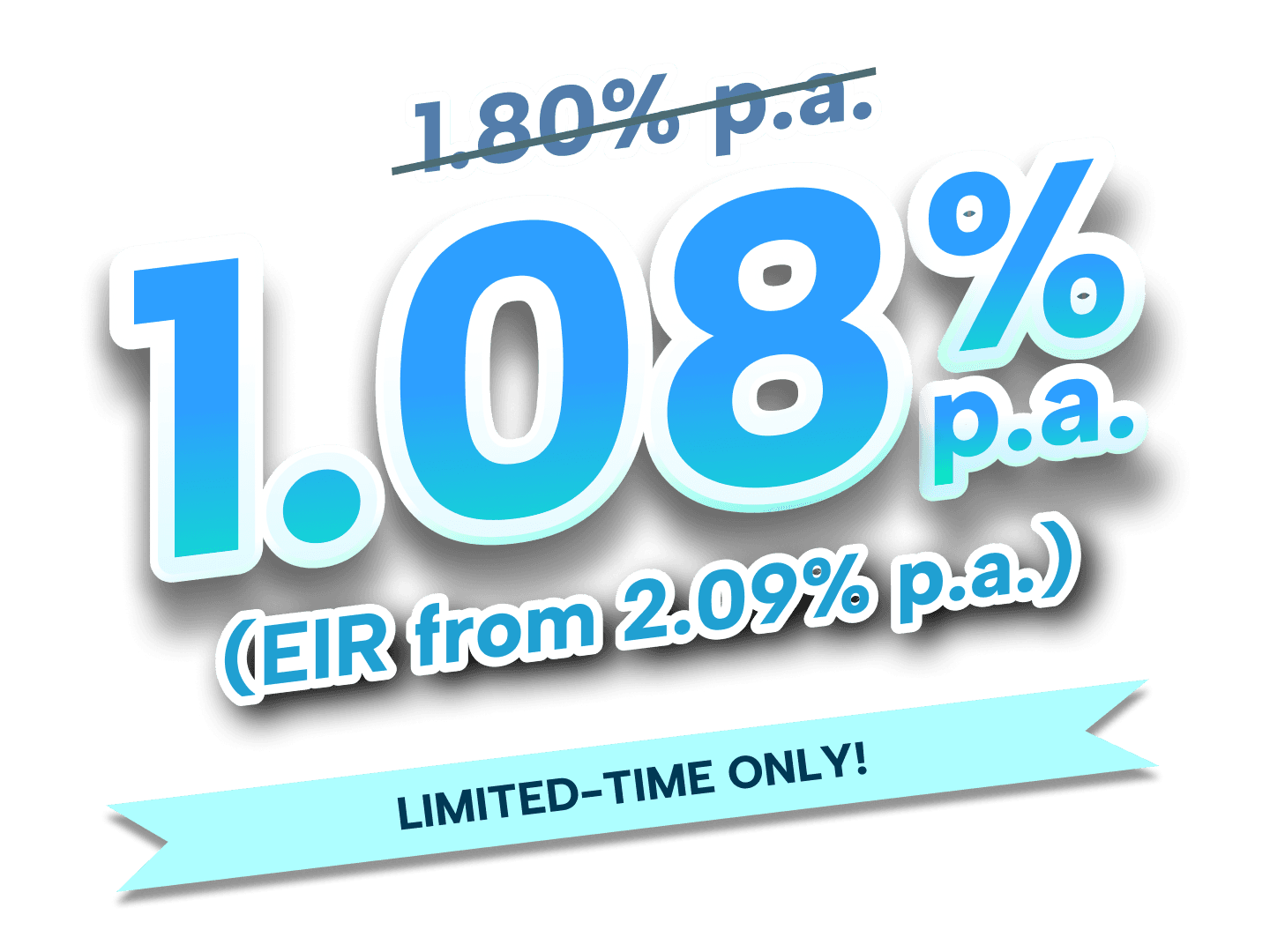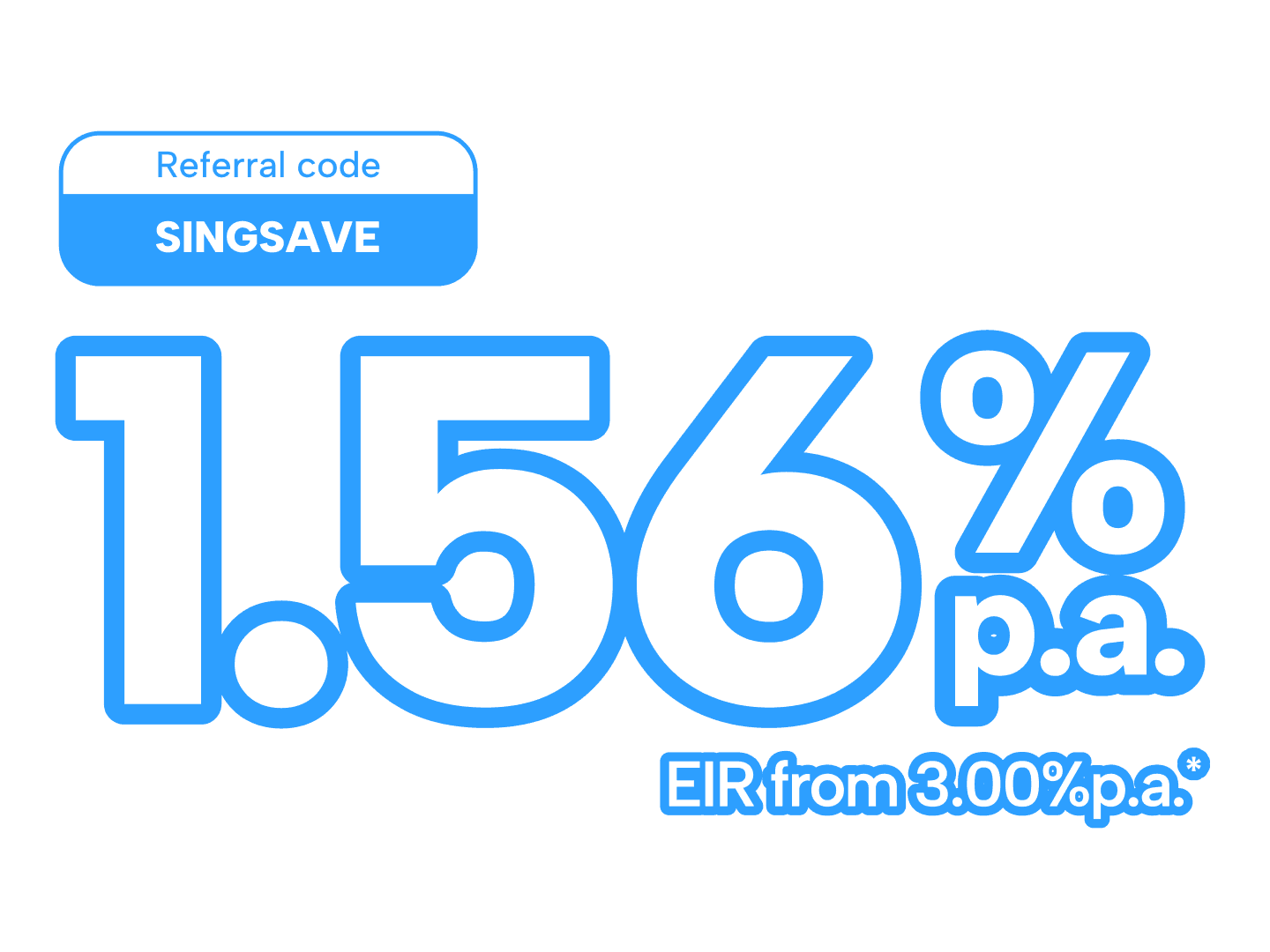Condo down payments in Singapore: How much do you need?
Updated: 22 May 2025
The amount you will need for a condo down payment in Singapore depends on several factors, including your mortgage type, lender requirements, and personal finances.
Written bySingSaver Team
Team
The information on this page is for educational and informational purposes only and should not be considered financial or investment advice. While we review and compare financial products to help you find the best options, we do not provide personalised recommendations or investment advisory services. Always do your own research or consult a licensed financial professional before making any financial decisions.
Make your home ownership dream a reality
Navigating home loans can be tricky, but with SingSaver, you’ll have access to expert guidance and the best rates. Get matched with the right loan for your new home, whether it’s a bank loan or an HDB loan. Don’t miss out on the best financing solutions!
For many homebuyers, saving up for a down payment is one of the biggest challenges in buying a property. But how much do you actually need? Let’s break it down so you know what to expect and discover useful tips for first-home buyers.
Top home loan rates in Singapore - SORA
|
Loan tenor |
First Year interest |
First year monthly instalment |
Three year average interest |
Lock-in period |
|
|
Mortgage Master 3-Month SORA |
30 years |
3.15% |
5.16K |
3.20% |
2 Years |
|
DBS 3-Month SORA |
30 years |
3.05% |
5.09K |
3.05% |
2 Years |
|
OCBC 3-Month SORA |
30 years |
3.05% |
5.09K |
3.13% |
2 Years |
Top home loan rates in Singapore - Fixed
|
Loan tenor |
First Year interest |
First year monthly instalment |
Three year average interest |
Lock-in period |
|
|
OCBC 3 Year Fixed |
30 years |
2.45% |
4.71K |
2.45% |
3 Years |
|
DBS 3 Year Fixed |
30 years |
2.55% |
4.77K |
2.55% |
3 Years |
|
HL FInance 3 Year Fixed |
30 years |
2.60% |
4.80K |
2.60% |
3 Years |
SingSaver x DBS/POSB Personal Loan Exclusive Offer
Enjoy interest rates from 1.48% p.a. (EIR from 2.84% p.a*) when you apply for a DBS/POSB Personal Loan. Plus, get S$500 bonus cash on top of up to 3% cashback when you apply for a loan min. S$10,000 with a min. tenure of 3 years. Use the promo code (SINGSAVER) upon application. Valid till 1 March 2026. T&Cs apply.
What constitutes a down payment?
A down payment is the upfront amount you pay when making a major purchase, such as a home. The remaining cost is typically covered through a loan, which you repay over time. Down payments are usually expressed as a percentage of the property price — for example, a 10% down payment on a $350,000 home would be $35,000.
When you take out a mortgage to buy a property in Singapore, your down payment serves as your initial financial stake in the home. The lender covers the rest of the purchase price, which you then repay through monthly mortgage installments.
Most lenders require a down payment as part of their loan terms. However, certain loan programmes — particularly those backed by government agencies — may allow for low or even zero down payment options, depending on eligibility.
Is a 25% down payment required for a condo?
A 25% down payment is common when buying a condo in Singapore, but the exact amount depends on your loan-to-value (LTV) ratio and financial situation. The Monetary Authority of Singapore (MAS) sets LTV limits, which determine how much financing you can get from the bank.
If you take a 75% bank loan, your down payment will be 25% of the property price, and you’ll need to pay it as follows:
-
At least 5% in cash
-
The remaining amount can be covered with cash or CPF savings
Before deciding on your down payment, it’s essential to verify your LTV limit. This will determine both the amount you can borrow and the upfront payment you'll need to make, ensuring you’re financially prepared and informed about mortgage insurance requirements.
Saver takeaway
- Flexibility in your down payment: While a larger down payment can lower your loan amount, a smaller one can help you keep cash for other expenses.
-
Consider future expenses: If the home needs renovations, a lower down payment can free up funds for upgrades.
-
Emergency savings matter: Keeping extra cash on hand can be helpful for unexpected costs after moving in.
-
Home improvements can build equity: Upgrades can increase your property's value, potentially helping you reach refinancing goals sooner.
-
PMI isn't permanent: If your home gains enough equity, you may be able to refinance and eliminate private mortgage insurance (PMI).
» Read more on the costs of upgrading to a condo including down payment
Minimum down payment requirements
Your minimum down payment depends on several factors, including whether you're a first-time buyer, an existing homeowner, or purchasing a high-value property. Understanding these requirements can help you plan your finances effectively.
|
Number of active housing loans |
LTV limit |
Minimum down payment |
|
0 |
75% or 55%* |
5% (for LTV of 75%); 10% (for LTV of 55%) |
|
1 |
45% or 25% |
25% |
|
2 or more |
35% or 15%* |
25% |
*It is advisable to select the lower Loan-To-Value (LTV) limit if the loan term exceeds 30 years (or 25 years for HDB flats) or if the loan extends beyond the borrower’s age of 65.
Additionally, you can use your Central Provident Fund (CPF) savings to finance your home purchase, but there are limits on how much you can use.
Furthermore, stamp duty must be paid in cash before finalizing the purchase of a condo. However, if you have sufficient funds in your CPF account, you may request a refund. The amount of stamp duty is determined by factors such as the purchase price, the number of properties you own, and your citizenship status.
First-time buyers:
If you're buying a property for the first time, you may be eligible for an LTV ratio of up to 75%. This means you'll need to put down at least 25% of the property's purchase price as your down payment. Since you don’t have an existing home loan, lenders are generally more willing to finance a larger portion of your purchase. While saving for a 25% down payment can be a challenge, it’s a crucial step toward securing your mortgage and reducing your long-term borrowing costs.
Existing homeowners
If you already own a property and have an existing home loan, your LTV ratio may be lower — potentially dropping to 55% or less. This means you’ll need a larger down payment of at least 45% of the property price. Lenders typically impose stricter requirements on homeowners with existing mortgages, as taking on another loan increases financial risk. If you're planning to upgrade or invest in another property, it's important to consider how this higher downpayment requirement might impact your cash flow and financing options.
» Find out how to save for a house with a step-by-step guide
⚡SingSaver x SCB CashOne Personal Loan Flash Deal⚡
Enjoy SCB's Lunar New Year Interest Rate starting from 1.08% p.a. (EIR from 2.09%), the lowest in the market! Plus, get up to S$4,900 in Cashback when you apply for Standard Chartered CashOne Personal Loan via SingSaver. Valid till 1 March 2026. T&Cs apply.
Factors that affect prices of condos
When considering the down payment amounts for condos, there are a few things to keep in mind.
Loan-to-Value (LTV) limit
When you take out a loan from a financial institution, you need to consider the LTV ratio, which determines the amount a bank can lend you.
CPF
Your Central Provident Fund (CPF) account can be used to pay for your home purchase within certain limits.
Stamp duty
Stamp duty is payable in cash before you pay the condo deposit. However, you can get a refund using your CPF account.
The stamp duty depends on the following:
-
The purchase price of the property
-
Number of other properties owned, if any
-
Whether you are a Singaporean, PR or foreigner
For simplicity’s sake, here is a breakdown of how much you would have to pay for a condo in Singapore if it cost S$1,000,000.
|
Costs |
Citizens |
Permanent Residents |
Foreigners |
|
LTV (75%) |
S$750,000 |
S$750,000 |
S$750,000 |
|
Outstanding condo downpayment (25%) |
S$250,000 |
S$250,000 |
S$250,000 |
|
Minimum cash down payment (5% of 1,000,000) |
S$50,000 |
S$50,000 |
Not applicable (downpayment to be paid in cash fully as no CPF) |
|
Stamp Duty (Buyer’s Stamp Duty and Additional Buyer’s Stamp Duty where applicable) |
S$24,60 |
S$74,600(Includes Additional Buyer’s Stamp |
S$324,600(Includes Additional Buyer’s Stamp |
|
Total condo down payment (CPF and cash) |
S$274,600 |
S$324,600 |
S$574,600 |
|
Cash money on hand (minimum cash downpayment and Stamp Duty) |
S$74,600 |
S$124,600 |
S$574,600 |
How much CPF can you use for a condo?
In our example, the total down payment is equal to CPF plus cash. In this case, the minimum cash down payment is 5% of the purchase price (S$1,000,000), which is S$50,000.
In the case of a Singaporean, the total downpayment for the condo is:
S$1,000,000 x 25% = S$250,000
5% of S$1,000,000 is payable in cash and the balance of S$200,000, or 20% of the purchase price, can be paid from the CPF Ordinary Account.
However, the big question is, how much money do you have in your CPF account?
If you are an employee earning S$3,000 every month, it may take up to 10 years to accumulate S$200,000 in your Ordinary Account – so do check your CPF account balance before deciding on a purchase. You can also opt to top up any shortfalls with cash.
How is the stamp duty calculated?
If you are buying a condominium, Buyer's Stamp Duty (BSD) is a requirement and an additional cost to consider. It also applies to other properties, whether commercial or residential.
The amount of the charge depends on the property’s purchase price. For example, if you are buying a residential property, the following charges will apply:
|
Cost of the property |
BSD rates for residential properties |
|
First S$180,000 |
1% |
|
Next S$180,000 |
2% |
|
Next S$640,000 |
3% |
|
Balance |
4% |
There is a stamp duty calculator on the IRAS website which you can use to estimate the amount of stamp duty you will have to pay.
If you are purchasing a condo valued at S$1,000,000, the Stamp Duty (BSD) would amount to S$24,600. For Singaporean buyers, this is the total amount payable.
However, Permanent Residents (PRs) and foreigners are also subject to the Additional Buyer’s Stamp Duty (ABSD), which is 5% for PRs and 30% for foreigners.
Stamp duty must be paid in cash. However, if you have sufficient CPF balance, this amount can be refunded from your CPF account.
Unlock your dream home with the best loan tips
Your mortgage is likely your biggest monthly expense — but there are smart ways to reduce it. Learn how to save more on interest and repayment terms.
Advantages of making a larger down payment
Saving for a sizable down payment takes time, but putting more money down upfront can pay off in the long run. Here’s why it might be worth considering:
-
Lower monthly mortgage payments. The more you put down, the less you need to borrow. This means your monthly mortgage payments will be smaller, making homeownership more manageable. Since your loan principal is lower, you'll also pay less in interest over time, saving you money in the long run.
-
Better interest rates. Lenders reward borrowers who make larger down payments with lower interest rates. A bigger upfront payment reduces the lender’s risk, and in return, they may offer you a more competitive rate. Even a small difference in interest can add up to significant savings over the years.
-
Higher chances of loan approval. A larger down payment shows lenders that you're financially stable, which can improve your chances of getting approved for a loan. It also strengthens your negotiating power, potentially helping you secure better loan terms and avoid extra costs like private mortgage insurance (PMI).
⚡SingSaver x UOB Personal Loan Flash Deal⚡
Get affordable interest rates from 1.00% p.a. (EIR from 1.93% p.a.) plus up to S$1,900 in cashback and rewards when you apply for a UOB Personal Loan via SingSaver. Valid till 1 March 2026. T&Cs apply.
Determining the right down payment for private properties
Your ideal down payment depends on your financial situation, loan eligibility, and long-term goals. While a bigger down payment reduces your debt and interest costs, you’ll also need to consider your liquidity and future expenses.
-
Assess your financial readiness. If you have substantial savings and want to lower your mortgage costs, putting more money down upfront can be a smart move. However, it’s important to leave yourself with enough financial flexibility for unexpected expenses, home maintenance, and other commitments.
-
Understand Loan-to-Value (LTV) limits. Your required down payment depends on the LTV ratio, which varies based on your homeownership status. If you’re a first-time buyer, you may qualify for an LTV of up to 75%, meaning a 25% down payment. But if you already own a property, your LTV may be lower, requiring a larger upfront contribution.
-
Consider your long-term financial goals. If paying off your home sooner is a priority, a larger down payment can help you reduce your loan balance and interest costs. However, if maintaining liquidity for investments or other financial goals is important, you might prefer a smaller down payment and a higher loan amount.
By weighing these factors, you can determine a downpayment strategy that aligns with your financial situation and homeownership goals.
» Learn more about BTO vs Resale vs EC: Which gives the best bang for your buck for investment?
Will you be able to pay the monthly instalments?
Making the downpayment is only the first step on the way to owning a condo, because you still have to pay up to 75% of the purchase price. The question is how you will pay your monthly instalments. Or simply put, will you be able to pay? If you are getting a financing option from your lender, these are also important questions that you’ll need to answer.
Truth be told, it's no walk in the park and the monthly payments can be hefty. Currently, bank interest rates on home loans range from 1.25% to 1.6% per year. Of course, there are other factors to note, such as lock-in periods of up to two years.
For instance if you decide to buy a property at S$1,000,000 as in our example, monthly payments can be at least S$3,000 over a 20-year period with most banks.
So your income has to be sufficient to cover your instalments over the years. For a fixed rate of just below 1% (0.93%–0.97% depending on bank) in the first year, the table below reflects the lock-in periods for some loans:
|
Bank |
Lock-in period |
|
Maybank 3M SORA |
One year |
|
OCBC 1M SORA |
Two years |
|
HSBC 1M SORA SmartMortgage |
Two years |
|
DBS 3M SORA |
Three years |
|
Standard Chartered 3M SORA |
Two years |
On the other hand, other types of home loans may have floating interest rates, which could provide scope for refinancing your loan should the rates drop.
⚡SingSaver x Trust Personal Loan Flash Deal⚡
Enjoy low interest rates from 1.56% p.a. (EIR from 3.00% p.a.) plus up to S$1,750 in cashback and rewards when you sign up for Trust Bank Personal Loan via SingSaver. Plus, receive a S$10 FairPrice E-Voucher from Trust when you sign up with the referral code SINGSAVE. Valid till 1 March 2026. T&Cs apply.
Additional considerations for your condo down payment
When planning for your condo purchase, the down payment is just the beginning. Below are additional considerations that will impact your total upfront costs and long-term financial planning:
-
Stamp duty: In addition to the down payment, you will need to pay stamp duty, calculated as a percentage of the property’s value. For Singapore residents, stamp duty is calculated as follows:
-
-
1% for the first S$180,000 of the property value
-
2% for the next S$180,000
-
3% for the remaining value
-
-
Additional Buyer’s Stamp Duty (ABSD): If you are purchasing a second or subsequent property, the Additional Buyer’s Stamp Duty (ABSD) will apply. This can significantly increase your upfront costs, so it’s important to factor this into your budget.
-
Legal fees: You’ll need to allocate funds for legal fees when purchasing your condo. These costs cover contract reviews and other necessary legal processes involved in the transaction.
-
Renovation and maintenance costs: After securing your condo, renovation and maintenance costs are common. Singapore’s private condos vary in maintenance fees depending on the location and amenities. Make sure to budget for any renovations you might want and the ongoing costs associated with upkeep.
-
Existing loan prepayment penalties: If you already have an existing mortgage, it’s essential to check whether any prepayment penalties apply when refinancing or securing a new loan. These penalties can affect your financial planning and ability to manage debt.
-
Financing options: Explore different mortgage loan rate options from local banks and financial institutions to find the best terms for your financial situation. Additionally, consider government housing programs or subsidies that may be available to first-time buyers or those looking to refinance their mortgage.
By factoring in these additional costs, you’ll be better prepared for the financial commitment of owning a condo, ensuring that you can manage your mortgage alongside the other expenses of homeownership.
» Discover the complete guide to HDB down payments
Stay ahead in everything finance
Subscribe to our newsletter and receive insightful articles, exclusive tips, and the latest financial news, delivered straight to your inbox.
About the author
SingSaver Team
At SingSaver, we make personal finance accessible with easy to understand personal finance reads, tools and money hacks that simplify all of life’s financial decisions for you.




